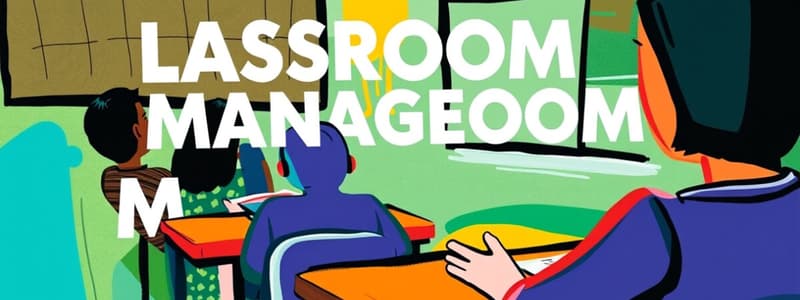Podcast
Questions and Answers
How should teachers respond effectively to minor disruptive behaviors in a classroom?
How should teachers respond effectively to minor disruptive behaviors in a classroom?
Teachers should not automatically refer to a counselor, have students seated within arms reach, scan the class frequently, state expectations clearly, ignore minor behavior, use proximity control, place sticky notes on desks, involve students in discussion, and use students' interests in lessons.
What steps can be taken to respond to major disruptions and defiant student behavior?
What steps can be taken to respond to major disruptions and defiant student behavior?
Use I-pronouns, talk calmly, and employ a de-escalation sequence.
What do Sheet & Gray state about students' beliefs regarding treatment?
What do Sheet & Gray state about students' beliefs regarding treatment?
Students believe they will not be treated fairly and expect the worst kind of treatment.
Why do students today fail to respond to authority?
Why do students today fail to respond to authority?
What is one of the most important skills we can teach students?
What is one of the most important skills we can teach students?
What do studies indicate about disciplinary referrals?
What do studies indicate about disciplinary referrals?
What should be assumed about students' understanding in academic settings?
What should be assumed about students' understanding in academic settings?
When managing social behaviors, what should a teacher avoid assuming?
When managing social behaviors, what should a teacher avoid assuming?
What is recommended when responding to behavior problems?
What is recommended when responding to behavior problems?
The sequence to de-escalate behavior begins with phase I: __________.
The sequence to de-escalate behavior begins with phase I: __________.
During phase II of de-escalating behavior, you offer __________.
During phase II of de-escalating behavior, you offer __________.
What is an ounce of prevention worth in behavior management?
What is an ounce of prevention worth in behavior management?
What should be avoided when handling violent student behavior?
What should be avoided when handling violent student behavior?
What should be done to support victims when dealing with bullies?
What should be done to support victims when dealing with bullies?
Why is problem-solving preferred over punishment?
Why is problem-solving preferred over punishment?
What are the five criteria to evaluate an efficient management plan?
What are the five criteria to evaluate an efficient management plan?
Flashcards are hidden until you start studying
Study Notes
Responding to Disruptive Behaviors
- Responding to minor disruptions requires maintaining teacher authority and clear expectations.
- Strategies include proximity control, involving students in discussions, and using students' interests to engage them.
Major Disruptions
- For major disruptions, utilize calming communication and "I" statements to express feelings.
- Implement a de-escalation sequence to address significant behavioral issues.
Student Perceptions
- Students believe they will face unfair treatment, leading to negative expectations regarding authority.
- Increased awareness of their rights often leads students to challenge authority more frequently.
Essential Skills for Students
- Teaching students to behave productively in group settings is considered a vital skill.
Disciplinary Referrals
- Disciplinary measures disproportionately affect students of color and low-income students.
- African American students often face harsher punishments, correlating with higher dropout rates.
Teacher Behavior and Assumptions
- Frequent assumptions include mistaking behavioral issues as learned defiance rather than skill deficits.
- Teachers may misdiagnose problems, failing to adjust their methods or present content effectively.
Responding to Classroom Disruptions
- Common disruptions include difficulties in obtaining attention, students competing for assistance, disengagement, and talk-outs.
- Effective responding strategies include arranging seating for accessibility and clearly stating expectations.
Teacher Effectiveness Training (TET)
- Gordon's approach focuses on "I-messages" to communicate concerns regarding student behavior.
- Canter's Assertive Discipline utilizes accountability methods like "clip up/clip down" systems.
Interventions for Defiant Behavior
- A structured intervention may be necessary for 10-20% of students exhibiting defiant behaviors.
- Establishing positive relationships with difficult students can mitigate conflicts.
De-escalation Techniques
- Validate feelings and clarify how behaviors affect others before presenting options and consequences.
- Provide students with choices and coping strategies during behavioral incidents.
Handling Violent Behavior
- Avoid confrontation and maintain calmness to defuse aggressive behaviors.
- Arrange environments to minimize risks and allow students to express emotions verbally as a release.
Addressing Bullying
- Support victims while directly addressing and removing the bully from situations until understanding occurs.
- Develop a school-wide strategy to confront bullying behaviors effectively.
Reinforcement and Responsibility
- Positive reinforcement encourages responsible behavior, but it should eventually be diminished.
- Highlighting long-term benefits of rule-following can enhance student understanding and compliance.
Importance of Problem Solving
- Problem-solving emphasizes support and growth, whereas punishment can inhibit learning and foster negativity.
- Punishment is often less effective in creating lasting behavioral change.
Evaluating Management Plans
- An effective management plan should be clear, sequential, dignifying, educational, and involve an environmental analysis to understand contributing factors to problems.
Studying That Suits You
Use AI to generate personalized quizzes and flashcards to suit your learning preferences.



